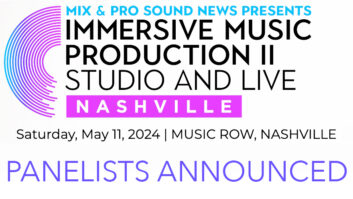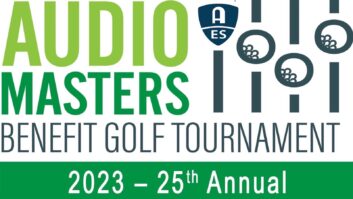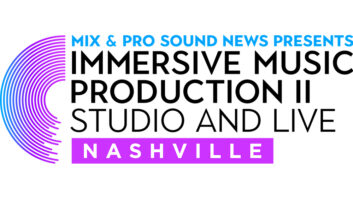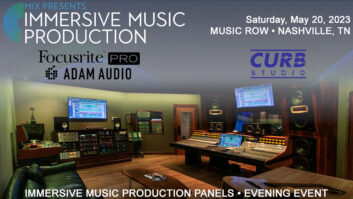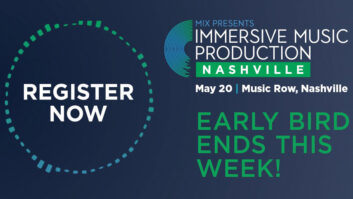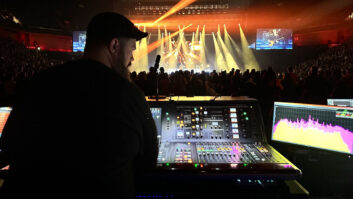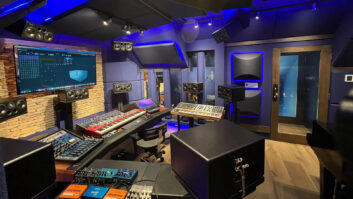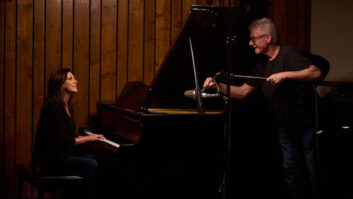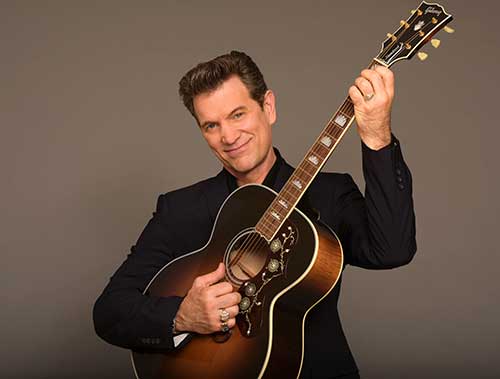
It’s been six years since Chris Isaak put out his last album of new songs, 2009’s Mr. Lucky. In between, he released an excellent covers record called Beyond the Sun, on which he tackled a bounty of 1950s Sun Records tracks by Elvis Presley, Jerry Lee Lewis, Johnny Cash, Roy Orbison and Carl Perkins—perfect, right? What took him so long to do that one?
Now he’s back with a new Vanguard release, First Comes the Night, and if you’re wondering whether his songwriting and musical approach have gone in some bold and unexpected new directions, all I can say is: Don’t be silly! Chris Isaak does what he does, which is what he’s always done, which is write wonderful original tunes that stylistically recall his talented forebears from the ’50s and early ’60s, sings them with an authenticity and conviction that has always taken him out of the category of “imitator,” and surrounded himself with musicians who share his passion for re-creating and, as importantly, updating the retro aesthetics he has championed since his first album, Silvertone, came out 30 years ago. For a guy whose songs often sound vaguely (or explicitly) like someone else, he is also strangely original. There’s no one quite like Chris Isaak.
If there’s a twist to First Comes the Night, it is that it was recorded partially in Nashville with a pair of the city’s top producers, Paul Worley (Dixie Chicks, Lady Antebellum, Martina McBride) and Dave Cobb (Jason Isbell, Shooter Jennings, Sturgill Simpson), with the remaining songs tracked with his longtime recording associate in L.A., Mark Needham, who’s worked with Isaak since 1988’s Heart Shaped World, on which his biggest hit, “Wicked Game,” first appeared. There are a few Nashville stalwarts who played on the album, and yes, some pedal steel guitar turns up on a couple of tracks, but this is not Isaak’s attempt to make the country charts next to Miranda Lambert, Alan Jackson and Kacey Musgraves. It’s still him being him.
Isaak admits he was initially skeptical about what Nashville had to offer, but he was quickly won over. “People told me, ‘It’s not just country. It’s a music city, with great producers and musicians and people that are into everything,’” Isaak says by phone from Australia, where he was spending the fall working as a judge on that country’s version of the X Factor TV talent competition. “So I went there and I was knocked out. It was like I went to the colony where everyone is like me. Every place I went, people wanted to talk about music or play music.”
Isaak’s first stop was working with Worley: “It’s not that I wanted the sound of Lady Antebellum; that’s a totally different thing, obviously, but I had the feeling that if a guy is really musical and knows the business and has chops…and brother, did he live up to that—Paul Worley is one of the most impressive men I’ve ever worked with. He’s kind, he’s smart and he has a depth of knowledge nobody can top.
“Part of being a great producer is not only hearing it in his head, it’s getting it out of somebody else’s throat. A lot of producers fail because they’re in the other room saying on the talkback, ‘One more take.’ ‘One more take.’ ‘Let’s do another one.’ And that means they don’t know what to tell you, so they’re just saying, ‘Again.’ Paul was never stumped. He’d come in and he’d talk in terms that were just really specific and detailed: ‘I need you to open up your chest voice a little more on this line,’ and, ‘You don’t need to articulate this part of the line so much.’ It was really great direction; he has great ears.”
The main sessions with Worley took place at the producer’s favorite room in Nashville, the Neve VR-equipped Warner Studios, using a combination of Isaak’s rhythm section (drummer Kenney Dale Johnson, bassist Rowland Salley and keyboardist Scott Plunkett) and various Nashville session aces, including guitarist Jerry McPherson and drummer Chad Cromwell. Engineer Clarke Schleicher handled the live tracking, with most of the overdubs done later at Worley’s own Shabby Row studio, which has a Trident board.
“What I gave to Chris,” Worley says, “was a real love for crafting his vocals and pursuing them relentlessly. We spent many, many hours and days doing vocals, allowing him to figure out how he wants to interpret every line and how he wants those lines to pop out. He told me he really fell in love with the process.” Isaak has favored the same vocal mic for many years now: a custom model made by Didrik de Geer.
The Nashville sessions with Dave Cobb went down at the venerable Sound Emporium studio A, “Jack Clement’s old studio,” Cobb is quick to point out. “You can feel Jack’s personality in that room, and it was perfect for what we were trying to do, which was to capture old Nashville.” Matt Ross-Spang, who was chief engineer at Sun Studios for about a dozen years, cut the live sessions using “this ridiculously good-sounding Spectrasonics desk,” Cobb enthuses. “That studio also has some beautiful chambers, which we used a lot. There’s no way to fake that sound.
“Chris is definitely one of the best singers I’ve ever heard; just a beautiful tone and feel when he opens his mouth,” he continues. “Whatever that ‘it’ thing is, he’s got it, and he’s had it all along. He walks into a room and it’s magic. The band was stellar and he was stellar—nailing the vocals live every take.
“It was a blast working with him because I love old Roy Orbison records and Elvis records and Jerry Lee records, and he’s the only guy on the planet who can get away with making records that feel that way because he has an authenticity. If he’d been around in the ’50s, he probably would have been one of those guys.”
Five of the 17 songs on the deluxe edition of First Comes the Night (highly recommended; the five bonus tracks are as good as any on the regular album) were co-produced by Isaak and Mark Needham, and recorded by Needham and Ben O’Neill at EastWest and Needham’s Ballroom Studio, both in L.A. (Needham mixed the L.A. tracks in the box at Ballroom.) “With Mark, it’s always totally comfortable because we’ve worked together so long and I trust him so much,” Isaak says. “I can wonder, ‘Is there too much bottom end on this?’ and if he says ‘No,’ then I don’t have to ask about it again. He brings so much expertise to everything he does, because he knows so much about different styles of music that it makes you comfortable.”
“We’ve worked together for something like 25 years at this point,” Needham comments, “and we work really well together with production ideas, bouncing stuff off each other. He did most of the arrangement ideas when they were writing the tunes. We worked out a few arrangements together. As usual, we cut the majority of the instrumentation live so we’d get that interaction between the musicians.”
As for EastWest, Needham says, “We’ve cut in there before and I’ve tracked there a lot; it’s one of my favorite rooms ever—I just a love the sound of that room. It’s not too big, but it sounds big, and the sightlines are great. It’s one of those rooms that just feels comfortable to play in, and of course the first thing I’m looking for is that everybody’s comfortable when they’re playing.”
Even after all these years together, Needham still marvels at Isaak’s dedication to his craft and endurance in the studio. “Usually after two or two-and-a-half hours with a singer, I’m calling the session because you can hear more differences in the vocals and they’re starting to get a little strained. But with Chris, he can go on for a phenomenal length of time and still sound great. It’s scary sometimes that he sounds so strong after four or even six hours.”
So, three different producers, four different mixers (Schleicher, Needham, Cobb and Darrell Thorp, who mixed two of the Cobb tracks), a bunch of studios and session players in addition to Isaak’s Silvertone band (which also includes versatile guitarist Hershel Yatovitz and percussionist Rafael Padilla), yet it all fell together beautifully to become an instant Chris Isaak classic.
Says Dave Cobb, “It was so much fun; that’s the thing. He’s the most easy-going guy. “I think everyone could take a lesson from Chris Isaak in how to be a good person and incredibly talented at the same time, and make great records.”

ONLINE EXTRAS: More from Chris Isaak and producers Paul Worley, Dave Cobb and Mark Needham
On recording vocals.
Isaak: At this point in my life I know how I want sound usually, but when you’ve just written a song, a lot of times you haven’t taken it as far as you will eventually with the vocal. It’s like: “How big is big here? Should I hit the big note like Pavarotti, or are we going more for Frankie Lane?” I can walk in the control room and listen to it and have idea of what’s right or wrong with a performance, but Paul had such a great ear for knowing—“You might want to come up a little on that.” And here’s a little sidebar on Paul: He would never say he can sing, but the fact is he is pitch-perfect. Most producers can’t sing a lick, but he can. In fact, I forced him to sing some backgrounds.”
Worley: We did lot of comping. I’m really careful with vocals and Chris is, too. We document the settings, down to the number of inches away from the microphone for each song, so we can maintain a continuity of tone. But there was also a lot of using track vocals and track acoustic guitar, comped in with the individual acoustic and vocal [tracks recorded right after the live takes].”
Needham: I have my own little vocal chain and especially on a song like [“Kiss Me Like a Stranger”] I really try to keep Chris front and center. If the vocal is getting buried, that mean’s something else is too loud. I’m using a couple of de-essers at different points and a combination of two compressors—an 1176 and an LA2A; also SSL E-series EQ and a Pultec for a bump on the bottom.
Cobb: On a song like “Running Down the Road,” Chris is right in the in the room with the band. There’s tons of bleed on his vocal microphone because he’s right next to the drums. But that’s the way they used to do it of course, so if they could do it, why can’t we try it?
Isaak on working with Dave Cobb.
Isaak: The two [Nashville] producers were different, and I hope to work with both of them again. Dave Cobb is a young guy with an old guy’s knowledge of music. And I love Dave because you sit with him and he tells you what he thinks; he is not pulling punches. You could name a really famous musician who everyone says is wonderful and Dave might say, “Hate him!” You say a song that’s a top ten hit: “Piece of junk!” [Laughs] But then, some other song nobody’s ever heard of, and he says, “One of the greatest songs ever written. Here’s why.” I love him because his heart is right out there. He feels music.
Usually, I’m a guy with a lot of ideas—I write the songs and I’ve produced a lot, so I always have opinions about how I want things to go. But Dave was great. At one point I said to him, “You know, I’m not one of those guys who you put in a spot in the studio and just sings. If I hear somebody say, ‘I think the drums should sound like this,’ and I disagree, I’ll step right in there. But so far you’ve had like eight ideas and I’ve liked every one of them.” Dave and I are on the same wavelength and we love a lot of the same stuff. He’s got really good taste, good ideas and good chops. He’s also hilarious.
Isaak on using players besides his own band.
Isaak: That’s not new for me. Everybody in the band, and the producers, understand the thing is to make a great record. There have been times when everybody in the band has sat down for a bit. Even me, in a way. I mean, sometimes I’m the songwriter, sometimes I’m co-writing with someone else and sometimes I’m covering other people’s songs. You pick the best material you can and you bring in the best players for every song.
My guys are definitely all over the record, but we have guys we brought in who are also great players, and I think it came out really good.
Q: For me, the surprise instrumental MVP is [Silvertone keyboardist] Scott Plunkett. He has so many cool textures, from retro Farfisa sounds to Jerry Lee piano.
Isaak: Thank you for saying that. I’m glad you noticed that, because you never know what people are going to notice. Scotty is a guy who works really hard and is really talented. But he acts like he’s still trying to prove himself. He got the gig. [Laughs] But he’ll come to work and go, “You know, I stayed up last night and I took the high-end of this part and I put some bottom end on this, and I think I’ve got a better sound for the piano…” And he’s always right about those kind of choices.
Needham: Scott’s developed as more and more of a force in the band when it comes to melodic ideas and textures. He’s really come into his own with Chris sound.
Cobb: His keyboard player was unbelievable; just magical. All those guys [in the band] are historians, too—they nail it.
Some final thoughts on Isaak from Paul Worley.
Worley: Chris gets away with [retro styles] because he comes from authenticity. He has a massive wealth of knowledge of music, and he can pull and create musical quotations from so many genres. We had such a blast doing that, because my roots are down here in the Southeast during the early rock and acoustic rock days, yet we had worked on the same rockabilly country artists. One of the first artists I ever produced was Burl Ives. We found a bond on just about everything we worked on. There was a lot of laughter a lot of joy in the room also a lot of hard work, but we never felt put upon to do the work.
